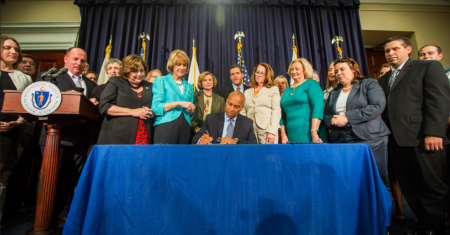Massachusetts Enacts New Abortion Clinic Protest Law After Supreme Court Rules Prior Law Unconstitutional

A month after a law restricting abortion clinic protests was struck down by the U. S. Supreme Court, Massachusetts passed a new law meant to replace it.
Governor Deval Patrick signed a bill into law Wednesday that will allow police to disperse any pro-life protests seen as impeding access to an abortion clinic, with said person or persons being barred from being within 25 feet of a clinic for a period of eight hours.
This contrasts from the old law that the Supreme Court found unconstitutional, which had a constant 35-foot buffer zone for abortion clinics that included public areas like side walks.
Known as the "An Act to Promote Public Safety and Protect Access to Reproductive Health Care Facilities", Patrick said in a statement that he was "proud to sign" Senate Bill 2283.
Patrick was joined by various pro-choice officials, including state Attorney General Martha Coakley, who represented Massachusetts before the Supreme Court in Coakley vs. McCullen.
"This bill takes an important step toward protecting the rights of women and public safety around reproductive health facilities," stated Coakley.
"We now have new tools to help ensure access to these facilities free from intimidation and threats. I am very thankful to the Governor for his leadership on this issue, and to the Legislature for their swift action."
In late June, the Supreme Court ruled unanimously that a Massachusetts law passed in 2000 restricting protests at abortion clinics violated freedom of speech and was unconstitutional.
"Petitioners wish to converse with their fellow citizens about an important subject on the public streets and sidewalks—sites that have hosted discussions about the issues of the day throughout history. Respondents assert undeniably significant interests in maintaining public safety on those same streets and sidewalks, as well as in preserving access to adjacent healthcare facilities," read the majority opinion.
"But here the Commonwealth has pursued those interests by the extreme step of closing a substantial portion of a traditional public forum for all speakers. It has done so without seriously addressing the problem through alternatives that leave the forum open for its time-honored purposes. The Commonwealth may not do that consistent with the First Amendment."
Introduced in the Massachusetts Senate a couple weeks after the Court's decision, S. 2283 was passed to be engrossed in mid-July.
From there, it went to the Massachusetts House where it was passed to be engrossed last week in a vote of 116 yeas to 35 nays.
The Senate concurred with the House's amendments and it returned to the House to be enacted with a vote 119 yeas to 33 nays on Tuesday.
On Tuesday, the Senate enacted S. 2283 and then presented it to the governor, who signed the bill into law on Wednesday.
"The law lets police disperse groups blocking access to abortion clinics, and then keep the protestors at least 25 feet away for up to eight hours," reported Sarah Birnbaum of WGBH News.
"Anti-abortion activists have said the new law is still not Constitutional and vowed to head back to court to challenge it."
In a statement released on their Facebook page, Massachusetts Citizens for Life said they were "disturbed" by the new law.
"We are deeply disturbed at this legislature's efforts to silence the voices of those they disagree with. We thank those legislators who voted against this new legislation, and we will closely monitor how this law is being carried out," stated the pro-life organization.
"Rest assured that Massachusetts Citizens For Life will be doing everything in its power to ensure that the voices of pro-life individuals are protected."





















